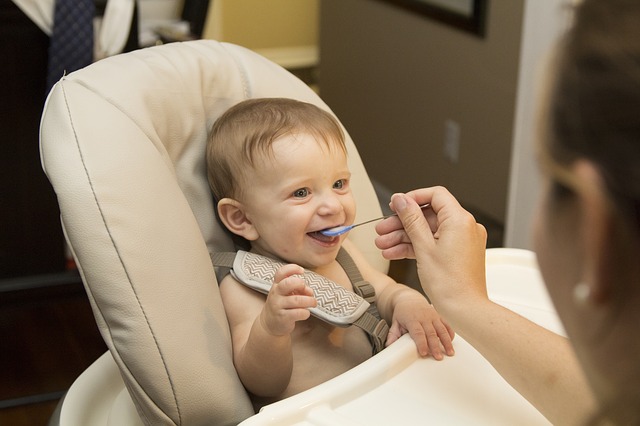
Your baby is growing fast. At the age of 6 months, he will even become an active member of your family, having developed new faculties that will allow him to be more awake, and sociable with the other members of your tribe. Find out what to expect when the baby has reached the fateful age of 6 months, and how best to accompany it in its development.
Baby is 6 months old ... and greater motor skills
The motricity of your baby will change greatly from 6 months, both its general motor skills and fine motor skills. For example, he can control his actions a lot and be active on a voluntary rather than a passive basis. This is good news, but also a sign that you will have to be more vigilant and watch it closely. He will indeed turn around a lot more often, and move around sometimes. At 6 months, your baby will also have the ability to sit for a few seconds, including keeping arms outstretched in front of him. However, this position will not be stable at all and it may fall. It is always good to keep an eye on him to avoid small sores.
On the side of fine motor skills, your baby will also make significant progress at this stage of his (small) life. He can now reach the objects that interest him with his fingers, and will be tempted to put them in his mouth. The oral stage of his development, which will generally last up to 1 year, will complete his other senses (including his sight and touch). Again, even if it is quite normal, and a sign that baby is growing up well, you have to be careful that he does not swallow anything or bring to his mouth objects that can be dangerous for him. So always keep an eye on him.
At 6 months, your baby will also be more sociable
After 6 months, your child will also be better able to interact with those around them, but also to communicate what they feel. Your baby should also be able to adapt to those around him, respond to conflict, and act in concert with your little tribe. For this, he will need to be surrounded and to have sustained social contact with other people, as these abilities are not innate and require continuous learning.
You will notice that your child will develop certain expressions (which he will imitate at home and your family). He should also react when you call his name and manage to express negative expressions while gesturing. At 6 months, your child will also start screaming to get your attention, babble to express his joy and seek to interact with other children.
To help him develop his new social skills, you can adopt the parental approach (which consists in Comforting, playing and teaching). This means accepting the activities he wants to do (instead of trying to impose them), but also allowing him to play with other children his age, while remaining present. Another important point, if you call your baby at 6 months, always do it in a cheerful voice so that he associates this solicitation with a positive emotion.
6 month infant and a greater intellectual capacity
Your baby is growing, and his intellectual abilities too. At 6 months, he will have more facilities to record information, to express himself and think creatively, but also to build an opinion on the things around him.
You will see for example that it pronounces more easily some consonants and syllables (like "b", "p", "m" ...) and imitate the sounds you produce. These will even allow him to hold some form of conversation with you. He will also be more open to the objects that surround him, and will even begin to observe them more closely, or from a different angle. He will also follow the objects of the gaze or turn to the person you have named.
Be careful, because if it is the traditional signals that can be observed in babies 6 months, they develop all at their own pace. The worst thing you can do as a parent is to push him or push him too hard to accelerate the appearance of these new intellectual abilities. Your baby has a unique personality and he develops at his own pace. You can, however, encourage him, and guide him to the right path with small gestures like him present games of different sizes during his bath. Also remember to partially hide his games (to encourage him to catch them himself) and to buy objects that make noise, or that can roll, etc.
Sleep, nutrition and health: how to care for babies at 6 months
Beyond its only development, there are more practical aspects of the care that you will give to your baby that will change at 6 months. For example, you will have to watch his weight gain (which should be between 5 and 9 kilograms), but also the appearance of his first teeth. Even if they can break through after 3 months, everyone will follow his own pace. And most importantly, the first teeth will not necessarily be painful (even if they can lead to digestive problems).
On the diet side, even though it will always feed mainly on milk, you can introduce new foods, such as cereals or animal proteins (always paying attention to monitor potential allergies). For lunch and dinner, you will also be able to add vegetables to your meals by mixing them well, because it will not have enough teeth to chew.
Finally, from 6 months, your child's sleep habits will also begin to change. He will now have 3 naps a day, and should have regular, uninterrupted nights.